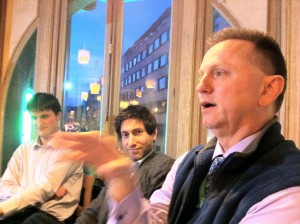 Last week, at the instigation of IABC and with some help from ZN, we organized another session of what is now becoming a regular Brussels get-together to talk about social media and the EU. To get the discussion started, we asked for the contribution of three panellists including Joe Litobarski (Blogactiv, @eurogoblin), Ian Andersen (EU Commission @antusheng) and Steffen Moller (Fleishman-Hillard, @steffenmoller). My job was to moderate and attempt to stimulate the discussion. After a relatively slow start, we got off to a very interesting discussion on the role that social media could play in “Saving the EU from itself”. To spice things up, Steffen and Joe were asked to take a position for and against the motion – I’m not sure who actually ended up defending what point of view.
Last week, at the instigation of IABC and with some help from ZN, we organized another session of what is now becoming a regular Brussels get-together to talk about social media and the EU. To get the discussion started, we asked for the contribution of three panellists including Joe Litobarski (Blogactiv, @eurogoblin), Ian Andersen (EU Commission @antusheng) and Steffen Moller (Fleishman-Hillard, @steffenmoller). My job was to moderate and attempt to stimulate the discussion. After a relatively slow start, we got off to a very interesting discussion on the role that social media could play in “Saving the EU from itself”. To spice things up, Steffen and Joe were asked to take a position for and against the motion – I’m not sure who actually ended up defending what point of view.
Soon after this the discussion shifted the the culture and attitude of the EU commission, with frustration expressed by people in and out of the institution about the challenges involved in getting good social media output – let alone good communication – to come out of the institutions.
However, hearing Ian Andersen describe his own experience with a focused, well organised and apparently effective Facebook campaign to recruit interpreters, it seems as the EU has some good stories to tell (or as described by @kosmopolit, “Islands of excellence“). The debate was followed by some twitter chatter and a few blog pieces, including one by Gellis.
Steffen shared some of the findings from the EP trends survey he’s been involved with, which continued to show how important not only social media but the web as whole is for politicians in getting information and starting to engage. Social networks are now used extensively by 69% of MEPs – up from 31% last year. This and other trends confirm the importance of the web as an information and communication tool in the EU political landscape.
The key question that was raised about the EU institution’s ability to communicate effectively was whether the culture and structure of the EU are able to take advantage of these new communication tools, or whether they present the real challenge in preventing the organisation from putting its message across before even being able to engage. There was an almost unanimous feeling that there was a serious problem within the institutions about how communication roles are approached, causing some serious flaws in the way certain campaigns are handled. What was refreshing, however, was how open those in the room were willing to be about recognising that something needed to change. Stating that Web2EU can help in this might be a little optimistic, but every little step in the right direction must be a good thing.
Those who want to take part in these discussions and help change things for the better should join us next time. And even if we see the debate going around in circles a little, perhaps this repetition will help to equip those who want more open communication, more transparency and to make their case a little stronger.











